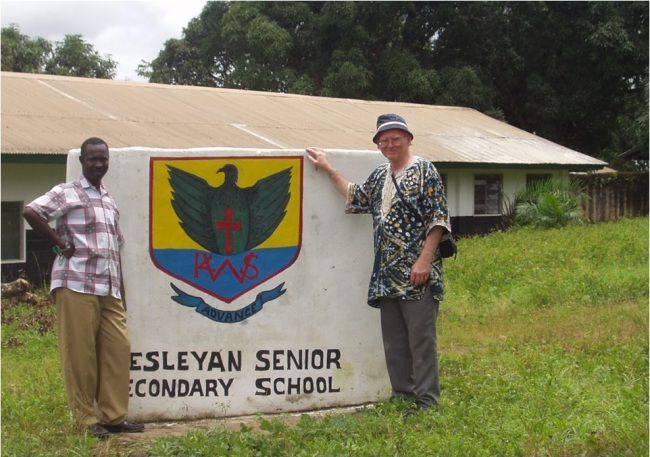A picture taken at Kamakwie Secondary School in 2002. The Principal, Mr. Hemo Brima, on the left.
Scripture Union camp was a spiritual highlight for secondary school students in Sierra Leone, West Africa. As chaplain and Bible teacher at Kamakwie Secondary School, it was my delightful privilege to participate in these camps. I am thinking particularly of a camp held at the Secondary School for Girls near Magburaka. It was always the custom at these camps to spend one night in village evangelism. We had walked to a nearby village. The young man who was to preach the gospel that night stood facing one of the houses. Fifty or sixty feet separated him from the house. The congregation was gathered in those fifty-sixty feet and on the houses’ veranda. I was sitting as inconspicuously as possible in a back corner on a side-wall in the shadows. A small Mosque was located next to this house. At the hour of evening prayer a half-dozen or so men entered this Mosque and began to pray. The Mosque’s hurricane lantern cast their shadows where I could see them as the men bowed to the ground and then again stood. With one ear I listened to the rhythm of these Arabic prayers, with the other, to the passionate proclamation of the Gospel of Christ. The difference was striking. 2 Corinthians 4:5 makes one aspect of this difference clear: “For what we proclaim is not ourselves, but Jesus Christ as Lord, with ourselves as your servants for Jesus’ sake” (ESV). A “Muslim” is one who is a servant or slave of God. We, however, who follow Jesus, are not simply called to be God’s servants or Christ’s servants, but servants of others for Jesus’ sake! We follow the one who said, “I am among you as the one who serves” (Luke 22:27 ESV); “If I then, your Lord and Teacher, have washed your feet, you also ought to wash one another’s feet” (John 13:14 ESV); and “For even the Son of Man came not to be served but to serve, and to give his life as a ransom for many.” (Mark 10:45 ESV, cf. Matthew 20:28). And then he proved it by going to the Cross!


